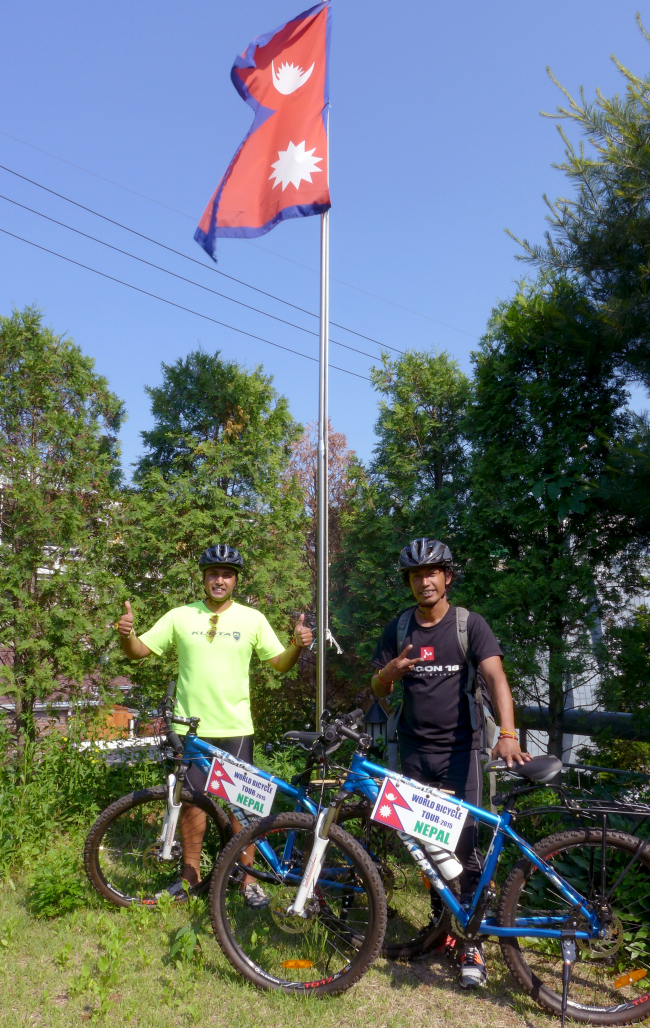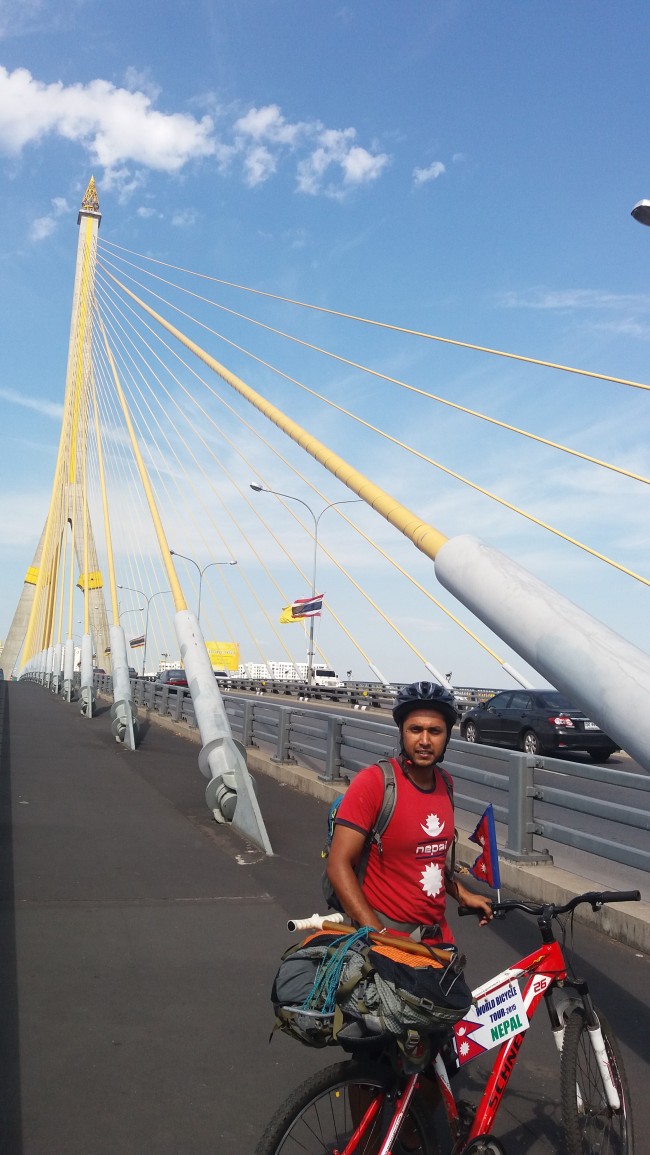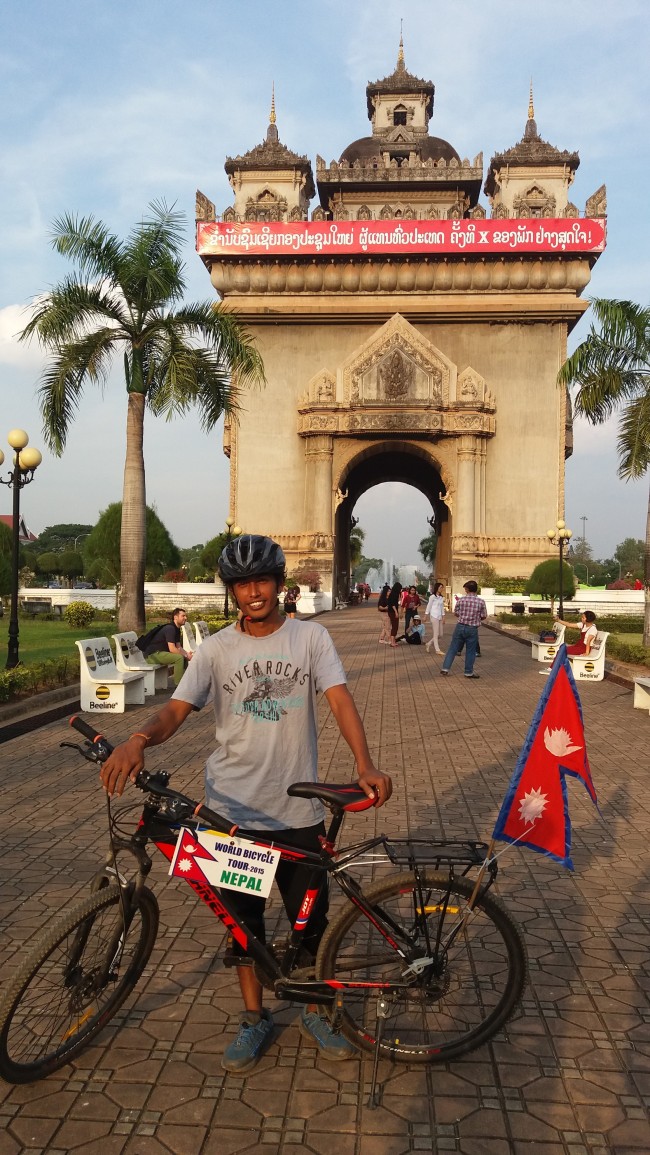Nepalese brothers cycle the world for environment, public health
By Korea HeraldPublished : May 22, 2016 - 23:13
Two brothers from Nepal are on a cycling journey across the world to raise awareness on saving the environment and preventing HIV. They arrived in Korea in early May, hoping to spread their goodwill.
“Our main purpose is to make people aware of the deteriorating nature and the harmful effects of stigmatizing HIV-AIDS patients. We reach out through the media in countries we visit,” Amrit Baral, 28, told The Korea Herald at the Nepalese Embassy last week.
“We chose the bicycle because it is the most eco-friendly and economic means of transport. It doesn’t burn fuel, but burns fat. It keeps you fit and healthy. Watching the world go on two wheels is amazing.”

Before starting their trip last September in Pokhara, the second largest city in Nepal after Kathmandu, Amrit was a medical doctor and his brother Ajit Baral, 27, was an environmental activist with a nongovernmental organization.
Carrying a tent, spare tubes and three liters of water each, the pair has traveled across India, Sri Lanka, Maldives, Myanmar, Thailand, Cambodia, Vietnam, Laos, Brunei, Malaysia, Singapore, Taiwan and Japan, before coming to Korea on May 7. They will cycle to Busan along the rivers, before moving to the next destination, part of a tour of 100 countries until 2020.
The brothers said they used their own savings in the beginning, but have relied on support from Nepalese embassies and communities along the way. They also operate online crowdfunding.
“We focus on water and air pollution, plastic overuse, wasteful water usage, overfishing, deforestation and global warming, with the mantra ‘Reuse, Reduce and Recycle,’” Ajit said. “Water has become a scarce resource around the world. Even in Nepal, which has bountiful water from the Himalayas, some reservoirs have dried up due to global warming.”
Amrit explained that people share water in communities in Nepal, where demand has surged with rising population.
“We need to save it for our next generations. Despite the abundance of water, Nepal does not yet have proper infrastructure to tap into its resource potentials,” he noted. “Our people live an organic, natural life. With modest needs, we are happy and friendly. A Nepalese proverb says, ‘Satisfaction is the great happiness in life.’”

Regarding the 7.8-magnitude earthquake that shook Nepal on April 25 last year, Amrit said reconstruction is continuing, albeit at a slow pace. He added that some locals believed the quake was caused by exacerbated climate conditions.
According to Vivek Kumar Srivastava, an assistant professor at India’s Kanpur University, “It now appears that there exists a clear relationship between global warming and earthquakes,” as the melting permafrost in the Arctic and rising sea levels lift pressure on the earth crust as well as magma chambers that feed volcanos.
The crust “bounces back” in what scientists call an “isostatic rebound,” leading to increased seismic activities along the fault lines, including the Himalayas, Andes, the Alps, Rocky Mountains and the Southern Alps in New Zealand, says the World Watch Institute.
Regarding HIV prevention, Amrit said significant money has been channeled into developing drugs, but scant attention is paid to education and awareness.
“HIV and AIDS cause opportunistic infections by destroying the immune system. Given proper education and action, it is a preventable disease,” he explained.
Describing it as one of the most important public issues in the world, Amrit stressed that people diagnosed with HIV should be protected from stigmatization through education.
By Joel Lee (joel@heraldcorp.com)

-
Articles by Korea Herald






![[KH Explains] No more 'Michael' at Kakao Games](http://res.heraldm.com/phpwas/restmb_idxmake.php?idx=644&simg=/content/image/2024/04/28/20240428050183_0.jpg&u=20240428180321)



![[Grace Kao] Hybe vs. Ador: Inspiration, imitation and plagiarism](http://res.heraldm.com/phpwas/restmb_idxmake.php?idx=644&simg=/content/image/2024/04/28/20240428050220_0.jpg&u=)









![[Herald Interview] Xdinary Heroes shoot for the next level with 'Troubleshooting'](http://res.heraldm.com/phpwas/restmb_idxmake.php?idx=642&simg=/content/image/2024/04/29/20240429050745_0.jpg&u=)